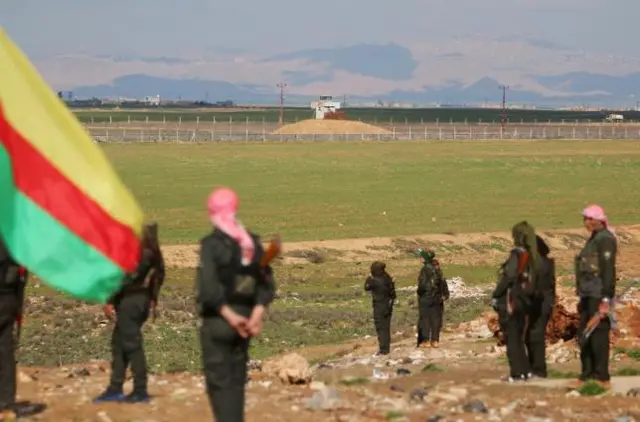Turkey and United States are facing challenges in maintaining robust ties over their divide on on Syria policies.
The gains by the Kurdish militia close to Turkish-Syrian border alarmed Ankara as Washington has pushed for a military offensive against holdouts of Islamic State (IS) group.
"Despite being allies in the NATO, Kurdish problem represents one of the areas that the interests of both countries do not completely overlap with each other," Yasar Yakis, former foreign minister and a leading analyst on Turkish foreign policy, said.
Turkey, worried about the specter of an autonomous and possibly an independent Kurdish region along Syrian border, lambasted the United States for supporting the Kurdish Democratic Union Party (PYD), listed as terrorist organization only by Turkey.
Ankara claims the PYD is linked to the outlawed Kurdistan Workers' Party (PKK), also listed as terrorist group by Turkey in addition to the United States and the European Union.
Nevertheless, Washington sees the People's Protection Units (YPG), an armed faction of the PYD, as an effective force on the ground that can take on the IS.
Washington has provided arms, military counseling, and air cover for the YPG despite a chorus of objections by its ally Turkey.
Yakis said Turkey should pursue a policy that will find a reasonable ground to cooperate with the PYD considering that the PYD can also work easily with Russia.
Earlier this week, the U.S.-backed Syrian Democratic Forces (SDF) which consists of mainly the YPG militants as well as Arab and other fighters, pushed an offensive to clear the IS from Manbij area in Aleppo province near the Turkish border.
The group reportedly crossed the Euphrates river on Thursday, something that Turkey has long described as a redline.
Turkish government spokesperson and deputy prime minister Numan Kurtulmus said on Wednesday that Ankara informed Washington that the PYD would be crossing a redline if it attempted to cross to the west of the Euphrates.
"Will it (the United States) continue its long-standing NATO alliance or will it establish new alliance with forces which are known to be against Turkey?" He asked.
Melih Asik, a Turkish analyst, says the chance to thwart the PYD advance is long gone.
"Our last redline was crossed over," he lamented.
Turkish President Recep Tayyip Erdogan tried to allay concerns on reported news of the PYD crossing to the west of the Euphrates, saying on Thursday that Washington has given assurances to Turkey that the offensive would be conducted by mainly Arab forces rather than Kurdish militants.
"The main forces are Arab militants. That is what we were told, " he said during his visit to Kenya.
Erdogan also issued a warning to the PYD, saying that Ankara will not hesitate to take an action to secure its border and that it does not need anybody's permission to intervene.
However, Turkish analysts question the sustainability of Ankara policies on Syria in general and on PYD in particular.
"At the end, one way or another, Turkey will soften its position towards the PYD," Asli Aydintasbas, Turkish expert on foreign policy, she said.
(APD)
 简体中文
简体中文

